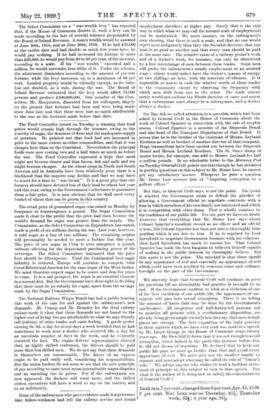Some of the railwaymen who gave evidence made it a
grievance that lellow-workmen had left the railway service and found
employment elsewhere at higher pay. Surely that is the only way in which what we may call the natural scale of employments can be maintained. We must assume, on the railwaymen's own showing, that there is such a scale, and that no one would reject more indignantly than they the Socialist doctrine that one man is as good. as another and that every man should be paid at the same rate. The relative value of a railway porter's work, and of a docker's work, for instance, can only be discovered by a free interchange of men between these trades. Some men will prefer the railwaymen's steady employment at an assured wage ; others would rather have the docker's spasms of energy at two shillings an hour, with the intervals of idleness. It is impossible to assess in cash the relative worth of these trades to the community except by observing the frequenoy with which men drift from ono to the other. The trade unions surely would not endorse the Hindu doctrine of caste and assert that a railwayman- must always be a railwayman, and a docker always a docker.


































 Previous page
Previous page